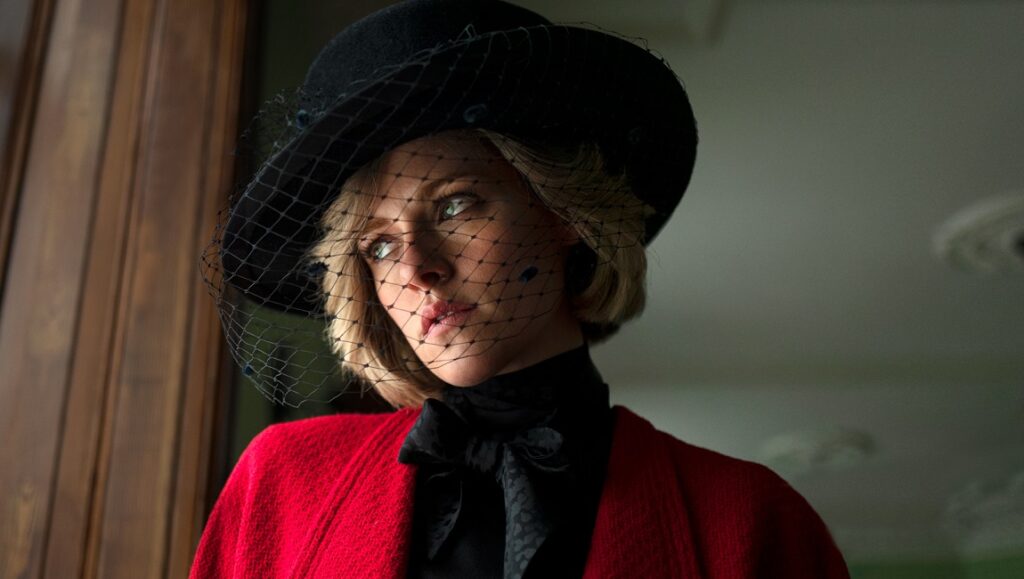Larrain is given massive assists courtesy of Stewart and Spencer‘s A/V artists, but everyone is let down time and again by the film’s wildly unsubtle script.
With his 2016 biopic Jackie, Chilean director Pablo Larraín built upon his previous “Best Foreign Language Film” Oscar nomination for 2012’s No, earning three nominations from the Academy and suddenly positioning him as a major Hollywood filmmaker. Yet despite what its historical biopic trappings suggested, Jackie was superior to the average awards contender it faced off against, refusing the toothlessness that tends to characterize this genre and strata of cinema. Larraín quickly backed away from AMPAS acceptance with his subsequent film, the ultra-abrasive Chilean production Ema, and then visited somewhere else entirely (Apple TV+) with the Stephen King miniseries Lisey’s Story this past June. Through a series of distribution mishaps (COVID + challenging marketability), the general American public didn’t get to see Ema until this past August despite its 2019 festival run, meaning that with the release of his latest film Spencer this week, Larraín has seen three significant projects debut in the U.S. market this year, his stature in the contemporary cinematic landscape major. Spencer comes along with a crew and cast worthy of such ascendancy, and an irresistible premise that places it in conversation with both Jackie and Ema. Of course, it’s that former film that Spencer is most obviously attempting to establish lineage with, though unfortunately, this new one doesn’t do much more than superficially fulfill this comparison, mostly stuck playing Jackie’s same beats to a negligibly different rhythm.
This time around, Larraín’s interests have shifted from Jackie Kennedy and the U.S. dynasty to Diana, Princess of Wales and the British royal hierarchy/family. Whereas Jackie followed the former first lady in the moments and days immediately following the death of her husband, president John F. Kennedy, Spencer’s screenplay is careful to locate its action away from the tragedy that has come to most characterize its title character in cultural memory, picking up with Diana on Christmas Eve, 1991. Still a few years away from the divorce and the subsequent media frenzy that now feels inextricable from the event of her death, Steven Knight’s screenplay pinpoints this 72(ish)-hour window as a means with which we can potentially reconcile her myth and reality. Knight is certainly one of the goofier writers working in Hollywood these days (Locked Down, Serenity), albeit one with a clarity of voice and proclivity for structural playfulness that has resulted in a couple major scripts (Eastern Promises, Allied, maybe Locke depending on who you’re talking to). This Spencer screenplay lands somewhere in between these two poles — tense and convincingly paced like a thriller, but rife with redundant explanation of character interiority and laborious metaphor. Which is quite a shame, as Knight’s writerly overcompensations are totally unnecessary, the team assembled for this production beyond capable of translating the subtext of his script without the crutch of clumsy expository dialogue.
Kristen Stewart is, naturally, the draw here, having spent the last several years asserting herself as one of the most thrilling actors currently working in the medium (her performance in Olivier Assayas’ Personal Shopper stands as one of the greatest of the 2010s), and Spencer offers her the opportunity to flex on Academy voters who previously shunned her. Unsurprisingly, Stewart seizes the moment with her usual skittish intensity, transforming (partially thanks to some remarkable make-up artistry and a vintage Chanel wardrobe) seamlessly into this version of Diana. Like Natalie Portman’s portrayal of Jackie O., this Diana is more a construct than a person, taking into account pop culture perception as well as Knight’s interpretations and assumptions of her character. Stewart locates the right tenor with which to channel this vision of Diana, steering away from realist caricature in favor of exaggerated physical performance that casts her as a fluid spirit ensnared in the rigid, punishing systems of the monarchy. Stewart’s Diana constantly flaunts her always heightened emotional state, wincing and grimacing at the camera (the ones on screen and the one shooting the movie), her rare moments of exuberance saved for her time with her young sons William and Harry. Cinematographer Claire Mathon (currently on a hot streak after shooting Atlantique and Portrait of a Lady on Fire back to back) favors Stewart’s pronounced face-acting and Larraín’s busy compositions with tight 16mm camerawork and a stately, muted color palette (less appealing than what was chosen for Jackie, but appropriately British), while Johnny Greenwood provides a suitably anxious jazz score that matches the lead’s freneticism. But time and time again, all are let down by the Knight’s wildly unsubtle script. Jackie was similarly tripped up by the loudness of former Today Show producer Noah Oppenheim’s screenplay, but his was at least surprisingly irreverent and matched tonally by that film’s soapy excess. Spencer isn’t quite gaudy or excessive enough to bear the burden of Knight’s bluntly unsophisticated observations on the sad paradox of Princess Diana’s life (power v. agency), and in this way, pales in comparison to Larraín’s last couple projects which addressed similar ideas more creatively. Stewart ultimately triumphs with a bold, occasionally ingenious take on an ultra-publicized figure, but it’s very much in spite of the efforts of a screenplay that would otherwise reduce Diana down to an archetype really not so different from the very media depictions it sets out to critique.


Comments are closed.